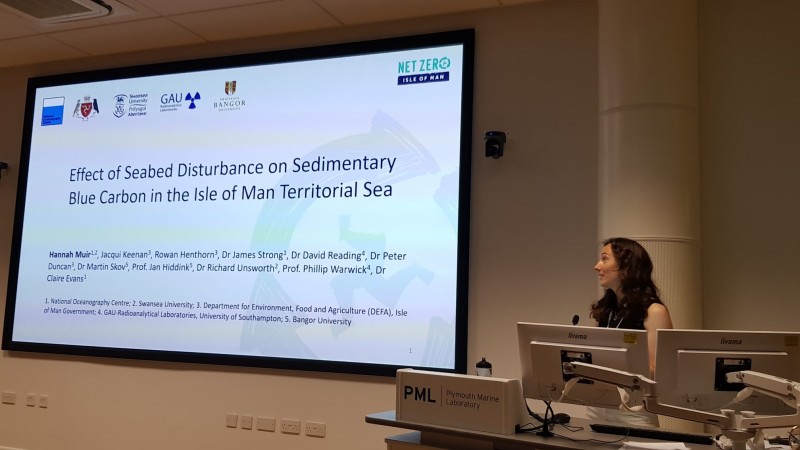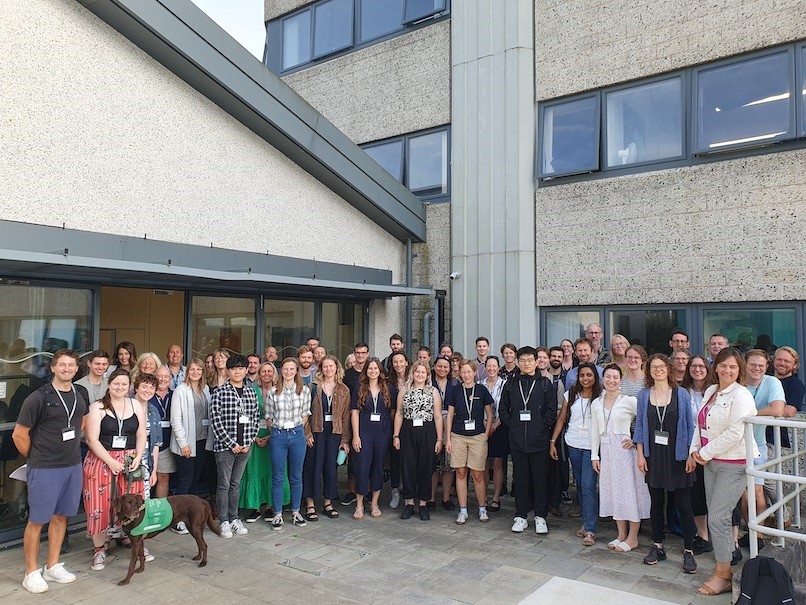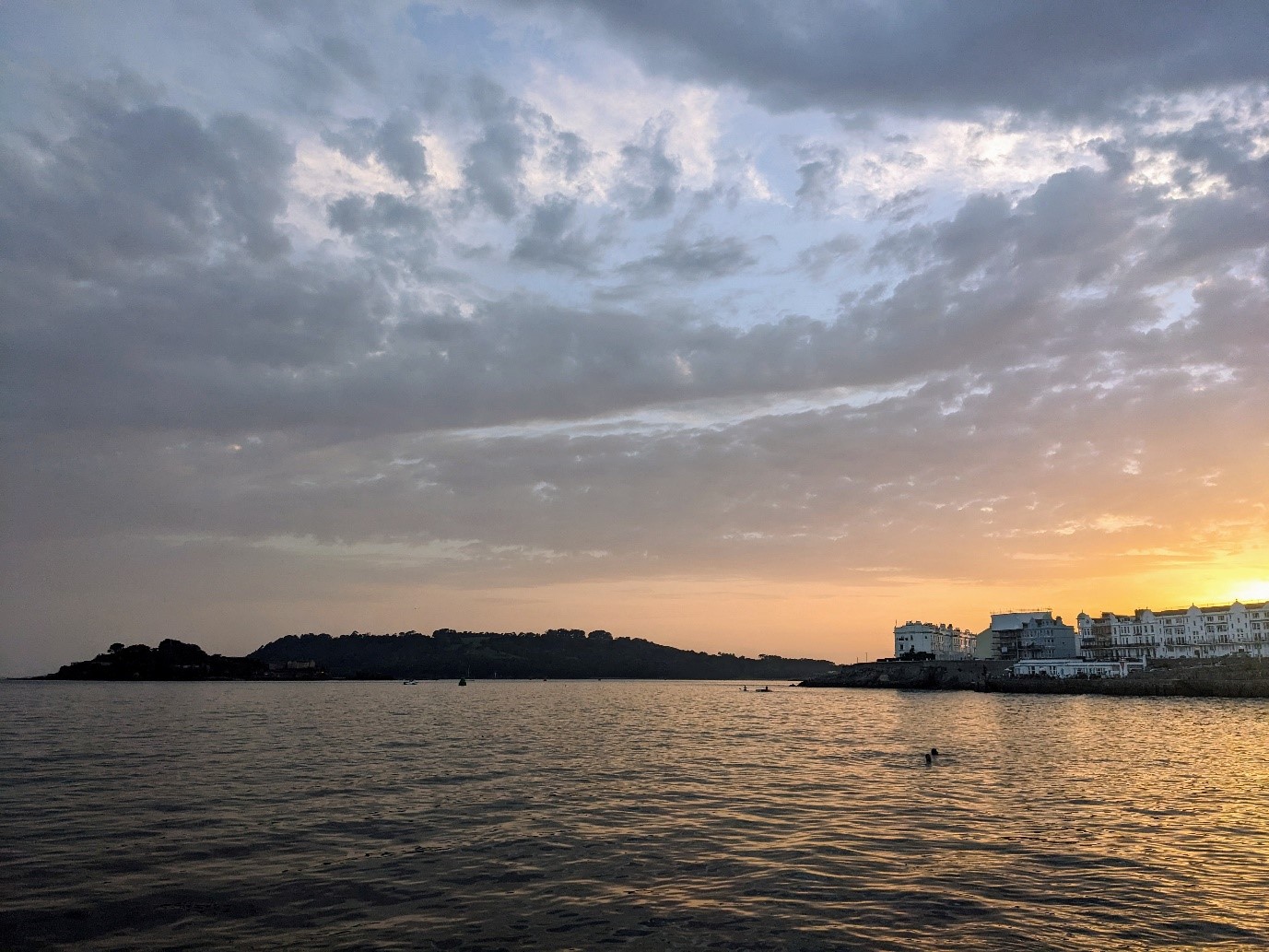Advances in Marine BioGeochemistry Conference
Hannah Muir
Swansea University

Caption: Photograph of me, Hannah Muir, giving a presentation at the Advances in Marine BioGeochemistry (AMBIO) Conference at Plymouth Marine Laboratory (Photo credit: Sarah Cryer, University of Southampton)
The Advances in Marine BioGeochemistry (AMBIO) Conference was held at Plymouth Marine Laboratory on 6–8 September, 2023. This was the first specialised conference I had attended as a speaker and only the second time I had presented my PhD research to a scientific audience.
Most people at the conference were from institutions based in the south of England as well as a few from the Netherlands, and there were countless early careers researchers studying PhDs. This made the conference a great place for networking with others at the same career stage as me, providing opportunities to discuss experiences of doing a PhD and to present my research in a relaxed environment. It was also nice to be able to attend a specialised conference so close to home, as it meant that sustainable travel options were available, which was a key factor in my decision to attend AMBIO.
There were four main sessions during the two days: Biogeochemistry and Marine Autonomy; The Cutting Edge of Biogeochemical Observations and Modelling; The Future of GEOTRACES; and Marine Biogeochemistry at the Sediment-Water Interface. There was also a poster session and opportunities during breaks to browse these over a coffee, which was another great way to meet others.
My presentation was in the final session, which was nice, as it allowed me time to get to know other people and feel comfortable in the small conference setting. I was pleased with how my talk went at the conference and I received some great questions and informative feedback. Some of the questions stimulated deeper conversations in the coffee break around the hydrodynamics in my research area, which I had not considered yet, as well as discussions around how to get my field of research (sedimentary “blue carbon”) into policy-making realms. I also made some useful contacts, who I have been in touch with since to share knowledge.
Caption: Photograph of attendees at the Advances in Marine BioGeochemistry (AMBIO) Conference outside Plymouth Marine Laboratory. (Photo credit: Kate Hendry, British Antarctic Survey)
More broadly, it was fascinating hearing about all the different facets of the marine biogeochemistry field. Never have I been to a conference where every talk feels relevant in some way and, importantly, is genuinely interesting. We heard talks about everything from the biogeochemistry of coral reefs, to the global carbonate pump, biogeochemical dynamics in the Southern Ocean, and biogeochemistry assessments of deep-sea mining. I think specialist conferences like AMBIO are a great way to expand your perspective of your own work and to generate new ideas by combining expertise and interests with other researchers.
A highlight of the conference for me were the post-conference sea swims, which some of the PhD students organised together. Not only were these a fun way to end the day, but they provided informal opportunities for networking and were a great way to explore the city. Several PhD students left saying they would quite gladly work in Plymouth post-PhD!
I was grateful for the Challenger Society for helping to fund this opportunity for me to attend the AMBIO conference this year. Through this conference I have made great connections with new people, both within my own institution and further afield, including researchers from the UK and the Netherlands.

Caption: Photograph of a sunset over Plymouth Sound during post-conference sea swimming, whilst “networking” with other Early Career Researchers after the Advances in Marine BioGeochemistry (AMBIO) Conference (Photo credit: Hannah Muir, Swansea University).
Author profile:
I am a second year PhD student at Swansea University and the National Oceanography Centre, Southampton, where I study natural carbon storage in coastal and marine ecosystems around the Isle of Man. My research aims to inform the development of the Isle of Man Government's Blue Carbon Management Plan. Prior to my PhD, I had quite a varied career path. I started off studying for a Masters with Honours in chemistry at the University of Edinburgh, with a year of research at the University of Chicago. I then moved to Germany for 2 years as a materials chemistry journals editor for the international publisher, Wiley. Here, I helped to develop an in-house science communications team and transitioned to a full-time video editor and blog writer. Through this experience I developed an interest in project management and communications, so I relocated back to Edinburgh and took up a digital project management role for a local website design company. One year in, the pandemic hit, and during this time I started learning about the role of the ocean in climate change. To everyone's surprise (mine included!), I returned to university to study a Master's in marine science at Heriot-Watt University, where my interest in chemistry reignited. After graduation and a stint in the Marine Climate Change Team at Marine Scotland, I started my PhD. My main goal now is to center natural ecosystems within decision making at the interface of science, policy, and society.
Latest News
Marine Data Management, Governance and the MEDIN toolset
The Marine Environmental Data and Information Network (MEDIN) and OceanWise are delighted to invite you to attend our popular free online training workshop: ‘Marine Data Management, Governance and the MEDIN toolset’ on the 19th – 23rd of May 2025.
Workshop on the contribution of UK Arctic Ocean science to the International Polar Year 32/33
12:00 11th June – 16:00 12th June 2025: NOC Southampton (In-person with online option): Registration deadline 16th May
REGISTER HERE
Pre-meeting questionnaire (open to all)
The purpose of this workshop is for the UK Ocean Science community to discuss and then draft a prospectus document outlining the priority Arctic research questions the community would like to address during the run up to, throughout and beyond the International Polar Year 32/33. Additionally, to identify what unique strengths and technologies the UK has to help fill these knowledge gaps.
The second day of the workshop will be dedicated to writing groups, one for each of the priority research questions identified - from both the pre-meeting questionnaire (HERE) and day one discussion. By the end of the meeting, each group will have produced draft text and sourced supporting figures for the prospectus.
Post meeting, the draft will be opened for comments and suggestions from everyone, regardless of whether they were able to attend the workshop or not. It will then be shared with UK funders (UKRI, FCDO, DSIT, ARIA) and potential international programmes with whom we would like to collaborate (e.g. Arctic 2050, Norway). It will form a basis from which wider integration with terrestrial, atmospheric and cryosphere communities can be built, e.g. at the UK Arctic Science Meeting in September in Northumbria.
To ensure balanced community and ECR representation, and to ensure that the size of the writing groups is efficient and effective, if the number of registrations from individual institutes becomes overwhelming, we may contact individuals or teams and ask that each institute selects a smaller number of individuals to attend in-person. Please wait for confirmation of in-person attendance before finalising travel arrangements.
The workshop will be open to hybrid attendance and contributions on both days.
Challenger Society Council Position Vacancy
The Challenger Society for Marine Science (CSMS) are pleased to announce an exciting opportunity to support the next generation of ocean scientists and innovators. CSMS are looking for a new Council member to fill the Student Travel Awards and Stepping Stones Portfolio. The successful applicant will administer the travel and research grants available for Early Career Researchers.
The role involves:
- Receiving applications for the two schemes and responding to applicant inquiries
- Soliciting and compiling input from the rest of the Council for assessing the applications
- Communicating with successful and unsuccessful applicants for the two schemes
- Working with the Honorary Treasurer on allocating funds to successful applicants
- Following up with award winners on their reporting requirements
- Attending Council meetings four times a year (in person or online) and contributing to discussions and decision making for CSMS
The usual term for Council members is three years.
For more information about the CSMS Council, please follow this link: https://www.challenger-society.org.uk/The_Council
For more information about our Early Career Researcher grants and awards, please follow this link:
https://www.challenger-society.org.uk/Stepping_Stones
and
https://www.challenger-society.org.uk/Travel_awards
If you are interested in applying or have any questions regarding the role, please contact kathen@bas.ac.uk
